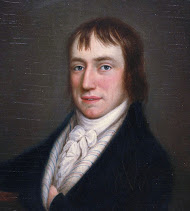It is, of course, from William Wordsworth:
It was written in 1802 when Wordsworth was 32 years old. It was also a
General Election in the United Kingdom. It was the first general election to be
held after the Union of Great Britain and Ireland, and initially a war-time
administration had been formed under Tory leadership, Great Britain having been
at war with France since 1792. The French Revolutionary Wars, resulting from
the Revolution of 1789, finally came to a close with the with the Treaty of Amiens.
Napoleon had become First Consul of France and established the Légion
d'honneur. Lord Elgin was packing up his Marbles stolen from the Parthenon
in Athens, the Rosetta stone ended up in the British Museum and a French
Expeditionary Force was suppressing the Haitian Rebellion under Toussaint L’Ouverture.
There was even war in Vietnam, with Emperor Gia Long or Nguyễn Ánh capturing Hanoi.
thus completing his unification of Vietnam.
It was the year Madame Marie Tussaud first exhibited her wax sculptures
in London, having been commissioned, during the Reign of Terror in France, to
make death masks of the victims.
It was also the year of birth of Victor Hugo, Edward Landseer, Alexandre Dumas and Dorothy Dix. It was also the year that another Dorothy, sister of William made a note in her diary:
“ …we left London on Saturday morning at 1⁄2 past 5 or 6, the 31st July (I have forgot which) we mounted the Dover Coach at Charing Cross. It was a beautiful morning. The City, St Pauls, with the River & a multitude of little Boats, made a most beautiful sight as we crossed Westminster Bridge. The houses were not overhung by their cloud of smoke & they were spread out endlessly, yet the sun shone so brightly with such a pure light that there was even something like the purity of one of nature's own grand Spectacles” Dorothy Wordsworth, The Grasmere Journal, 31 July 1802.
On that day William wrote another sonnet:
Composed upon Westminster Bridge
Earth has
not anything to show more fair:
Dull would he be of soul who could pass by
A sight so touching in its majesty:
This City now doth, like a garment, wear
The beauty of the morning; silent, bare,
Ships, towers, domes, theatres and temples lie
Open unto the fields, and to the sky;
All bright and glittering in the smokeless air.
Never did sun more beautifully steep
In his first splendor, valley, rock, or hill;
Ne'er saw I, never felt, a calm so deep!
The river glideth at his own sweet will:
Dear God! The very houses seem asleep;
And all that mighty heart is lying still!
One wonders what he would make of
the view now.
In November 1791, Wordsworth visited Revolutionary France and became enchanted with the Republican movement. He fell in love with a French woman, Annette Vallon, who, in 1792, gave birth to their daughter Caroline.
With the Treaty of Amiens again
allowing travel to France, in 1802 Wordsworth and his sister Dorothy visited
Annette and Caroline in Calais. It was on their way to Dover that he wrote the
poem on Westminster bridge. The purpose of the visit was to prepare Annette for
the fact of his forthcoming marriage to Mary Hutchinson. Afterwards he wrote
the sonnet "It is a beauteous evening, calm and free”, recalling a seaside
walk with the 9-year-old Caroline, whom he had never seen before that visit.
Mary was anxious that Wordsworth should do more for Caroline. Upon Caroline's
marriage, in 1816, Wordsworth settled £30 a year on her (equivalent to just under £3000
as of 2021), payments which continued until 1835, when they were replaced by a
capital settlement.
It is a beauteous evening, calm and free,
The holy time is quiet as a Nun
Breathless with adoration; the broad sun
Is sinking down in its tranquillity;
The gentleness of heaven broods o'er the Sea:
Listen! the mighty Being is awake,
And doth with his eternal motion make
A sound like thunder—everlastingly.
Dear Child! dear Girl! that walkest with me here,
If thou appear untouched by solemn thought,
Thy nature is not therefore less divine:
Thou liest in Abraham's bosom all the year;
And worship'st at the Temple's inner shrine,
God being with thee when we know it not.
All in all an interesting series
of sonnets, from the world is too much with us, to stopping on Westminster
Bridge, to walking on the beach at Calais with his 9 year old daughter, meeting
for the first time to let her know he was not going to be any great part of her
life. How calm and free did he feel?
So I continue to ponder wearily,
about the world we live in; how changes in lock down have again allowed travel
to France; how changes in the middle east or central Asia are cause for great
concern; how Governments will deal with the growing refugee crisis from so many
different parts of the planet; how world agreement might be reached in the
light of climate change and looming economic uncertainty; and what a creep and cheapskate
was William Wordsworth who had to be prompted by his new wife to settled even a small sum of money
on his then illegitimate daughter he claimed to feel was so close to God. Is it any wonder his world was too much ?



never trust a poet
ReplyDelete